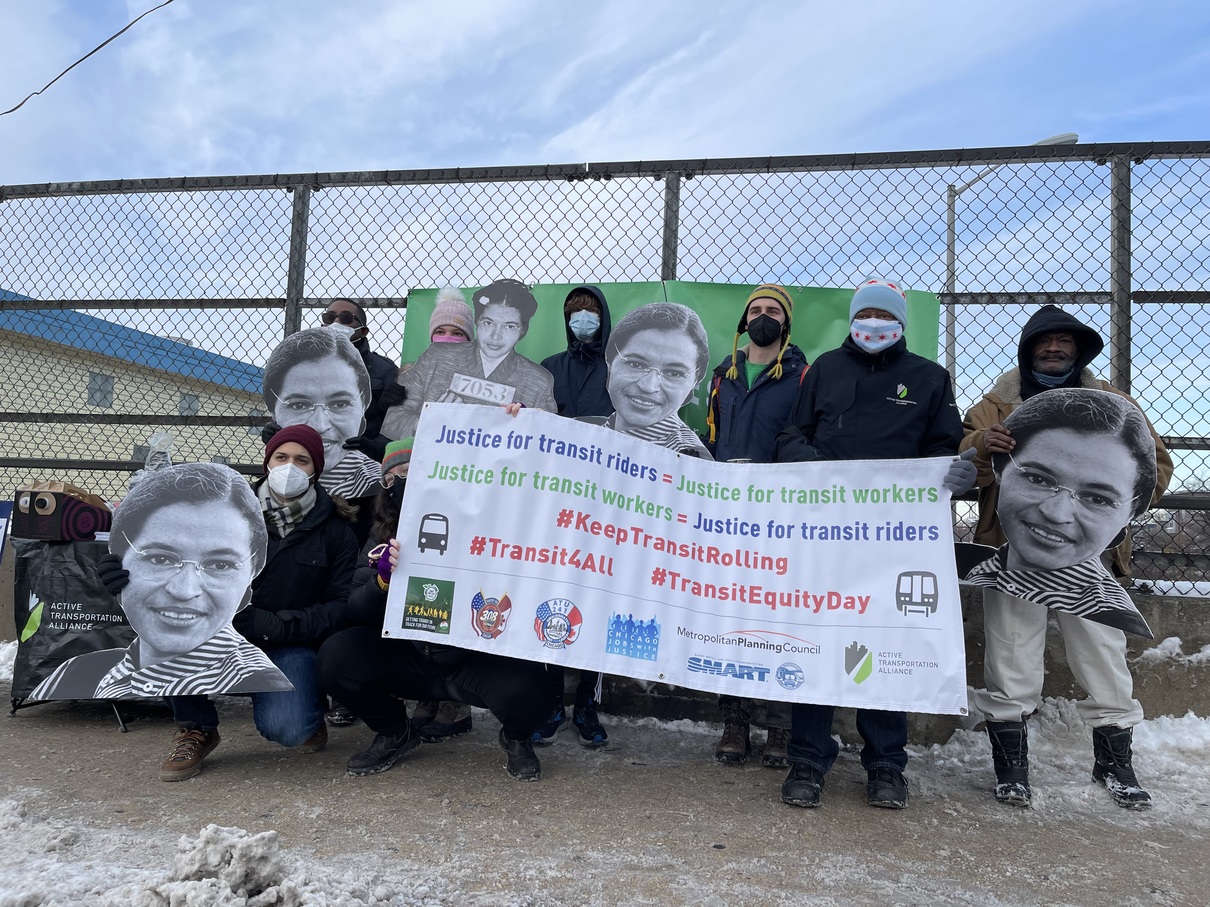“People always say that I didn't give up my seat because I was tired, but that isn't true. I was not tired physically… No, the only tired I was, was tired of giving in.” – Rosa Parks
February 4 is Rosa Parks’s birthday, and the Sierra Club is a part of a Transit Equity Day Network that commemorates the civil rights icon each year for her act of defiance of refusing to give up her seat on a bus in Alabama 67 years ago. Transit Equity Day honors Rosa Parks and many other leaders in the year-long Montgomery Bus Boycott, including Claudette Colvin, who also refused to give up her seat on the bus to a white person. While the movement to desegregate public transit in the US was ultimately won, there is much more work to be done for equitable access. In 2022, the fight is about accessibility to a reliable and non-polluting public transit system.
Over the last five years, Transit Equity Day has grown and become known all over the US. This year, Department of Transportation Secretary Pete Buttigeg and FTA Administrator Nuria Fernandez commemorated the day. Several governors and local elected officials from Wisconsin, Minnesota, and more states signed proclamations officially acknowledging February 4 as Transit Equity Day. Most importantly, the stories of transit riders and workers are being heard by those making decisions about the reliability of public transit in their communities.
WATCH THIS (with sound).
— SierraClubMN (@SierraClubMN) February 4, 2022
"I was tired...of giving in." ~Rosa Parks#TransitEquityDay #BlackHistoryMonth https://t.co/DltTSQib0S
Transit Equity Day is about empowering people to speak truth to decision-makers in their community about why having a reliable, accessible, and clean transit system will help mitigate the climate crisis, reduce toxic pollution – especially in low-income and communities of color – and connect residents to jobs, educational opportunities, and their loved ones.
How often does the bus come? Does the bus get you where you need to go? How long does it take you to walk to the nearest bus stop? Are bus drivers earning a living wage? Are they protected from COVID-19? Are the buses spewing dirty and dangerous pollutants out of their tailpipes? Are they contributing to the climate crisis?
These questions all assess a transit system, but too often the answers boil down to: Our transit systems need a major upgrade for the well-being of our communities.
This call was launched across the country last week, as people organized local events with transit riders, climate organizations, racial justice groups, labor unions, and faith leaders and shared their #TransitEquityDay stories about why transit matters to them.
This morning, we joined @ChicagoJwJ, @activetrans, @ATUComm, @LN4S, & @Transit4A for the official launch of Chicago's FIRST transit riders union on #TransitEquityDay! #transit4all pic.twitter.com/O3PmWg47dj
— Illinois Sierra Club (@SierraClubIL) February 4, 2022
Sierra Club Illinois co-sponsored a kick-off event for Transit for All, a campaign to launch Chicago’s first Transit Riders Union, spearheaded by Chicago Jobs with Justice, a coalition of labor, faith, and community organizations. After a press conference, the organizers canvassed riders to spread the word about the new riders union.
"We need to invest in clean public transportation for all,” said Sam Beard, an organizer with Sierra Club Illinois. “Not only to remain resilient in the face of climate catastrophe… not only to attempt to undo (just some of the effects of) centuries of compounded violence and oppression against Black, Brown, Indigenous and working class people… not only to reduce to our carbon emissions… but also to ensure that the life we have in the here and now, and the lives of our children will be lives worth living.”
Sierra Club’s Virginia Chapter hosted a virtual Lunch and Learn event that drew almost 70 attendees to discuss how to provide equitable transit without displacing the existing low and moderate income communities who rely on transit the most. The conversation included residents from a local mobile home park; local Sierra Club leader and environmental and climate justice chair of the state NAACP, Karen Campblin; and representatives from the Northern Virginia Affordable Housing Alliance and the Coalition for Smarter Growth.
For some, a Transit Equity Day event, especially in an ongoing pandemic, doesn’t necessarily mean a rally or a press conference. In San Diego, Sierra Club organizer Karl Aldinger published a local op-ed to draw attention to the many gaps in transit service in a car-centric city: “A deficient public transit system, like we have in most parts of San Diego County and most parts of the country, means long travel times, long wait times between buses or trains, no nighttime service and complete gaps in how you can use transit to get to where you need to go.”
This is just a sampling of how people within the Sierra Club community, alongside local and national partners, showed up to commemorate Transit Equity Day and uplift local efforts to make transit clean and equitable. We appreciate everyone who took part to spread the message!
